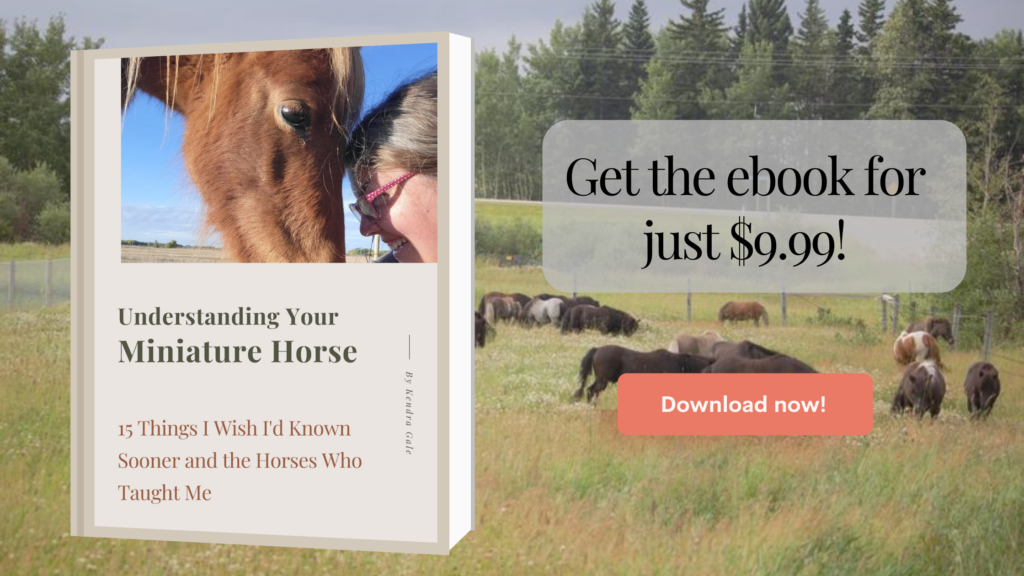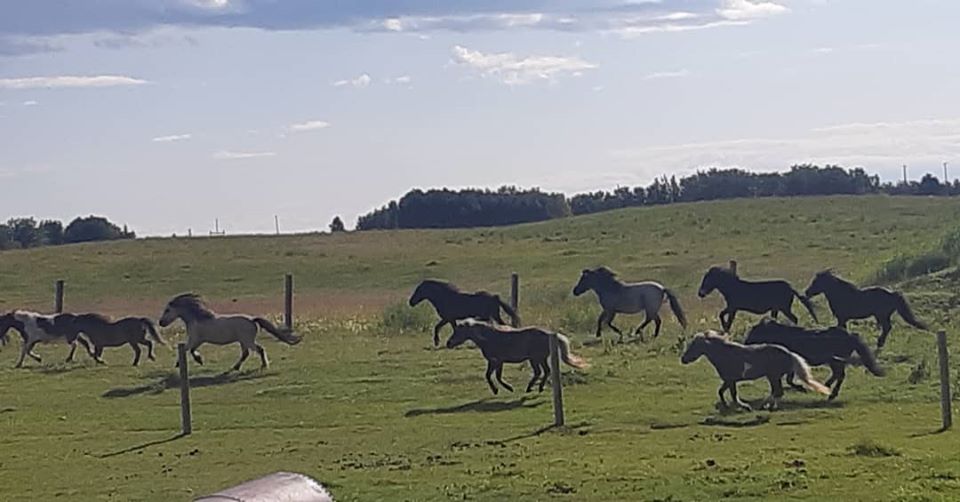If you’re new to Miniature Horses, or are thinking about adding some to your family, there is definitely a learning curve involved. Even if you have lots of full sized horse experience, there are still a few things that you need to know.
Body Condition Scoring
The thing everyone talks about is feeding, and it can be tricky to get it right, but getting well meaning advice from every direction can just make things harder, as every horse is an individual. What works well for someone else might not be what your horse needs.
So here’s my number one tip – learn to body condition score your horse. The Henneke method of BCS is pretty standard, and allows you and your vet or other professionals to speak the same language regarding your horse’s weight. Remember that you CAN NOT visually determine body condition on a Miniature Horse in full winter coat. You have to put your hands on them and feel for fat cover over their ribs, backbone and hips. After a lifetime spent with Miniature Horses, my ability to see through the hair is probably as good as anyone’s, and I still make a point of regularly taking off my gloves and feeling through the winter coats of my horses.
This is way more useful than being told what to feed or how much of it, as you’ll be able to make changes based on what YOUR horse needs to maintain a healthy weight.
For more on feeding, click here.
Young Horses Need Extra Care
It’s natural to want to add a “baby” to your family, as they’re so cute! But in addition to taking on the responsibility of training that baby to be a good citizen and deal with the routine handling of a domestic horse without stress, young, growing horses do require a lot more careful management than adult horses do.
Foals do most of their growing in their first year, so they need a LOT of nutrition to grow healthy and strong: free choice hay or pasture, a good complete feed balanced for growing horses, enough protein in their diet to grow strong muscles and bones, and momma’s milk until they’re at least 6 months of age. And checking their body condition diligently through their first winter especially, as too many people learn upon clipping in the spring that their wooly little baby was actually skin and bones under the hair.
Babies in their first year need frequent deworming, targeted to get rid of ascarids. Ascarids can grow up to three feet long in just 3 months – imagine that in the intestine of a tiny foal!
And babies need frequent hoof trims by a knowledgeable farrier to set them up to have strong and healthy feet and legs for the rest of their lives. As I type this, our foal Sparkle is 9 weeks old and has had her feet trimmed 3 times already – and she has great feet and legs with absolutely no concerns, if she did it would’ve been even more than that!
Health Concerns
In general, Miniature Horses require the same care as full sized horses and have all the same health concerns. They need to be checked for parasite load by Fecal Egg Count and be dewormed as necessary. (Don’t use Quest dewormer unless under the direct supervision and recommendation of your veterinarian – it’s difficult to dose for Miniature Horses and easy to have a dangerous overdose. There are other, safer options!) They need regular vaccinations against disease – and vaccines aren’t dosed by weight, so they get the same as a full sized horse.
The biggest health concern that I think everyone should know about is hyperlipidemia. If your horse doesn’t eat for a prolonged time, regardless of the reason, their body believes they are starving and dumps their fat stores into their blood stream. But they dump so much fat into the bloodstream that they can’t use it, and it’s filtered out by the liver and kidneys, which get all clogged up with fat. Unless it’s caught early in the process and treated aggressively, their organs will shut down.
If your Miniature Horse (or small pony, or donkey) ever doesn’t want to eat their food, it’s an emergency. Get them to a vet ASAP and be sure to mention that they’re prone to hyperlipidemia so they can draw blood and check right away. I’ve heard far too many stories of people who lost their horse because they didn’t know that not eating was an emergency and were too late getting them to the vet, or because the vet didn’t have a lot of experience with Miniature Horses and didn’t know how prone they are to becoming hyperlipemic.
You can learn more about hyperlipidemia here
And when to call the vet here
Hoof Care
Next to feeding concerns and not being aware of body condition under a winter coat, the second most challenging issue newcomers find is hoof care.
Miniature Horses need regular hoof trimming by qualified, knowledgeable farrier, or if you’re going to do it yourself, then you need to spend some time learning what they need. For context, I did take a farrier course in college, and am familiar with trimming, but don’t feel qualified to do my own, especially any with special needs, performance horses, or young, growing horses, so I have an excellent farrier that takes care of my herd.
Letting their feet become overgrown can lead to all sorts of issues that can affect their soundness and quality of life. Some require very frequent trims, either due to health issues (laminitis or founder) or just because they grow more quickly. Once again, treating each horse as an individual is key.
Fencing
Miniature Horses are small. If you’re bringing one home, you need to make sure your fences are appropriate. Too many Miniature Horses get a reputation as fence crawlers and escape artists because people expect the same fence designed to contain a 15hh horse is going to contain an 8hh horse, which it often won’t. Of course, some Miniature Horses ARE fence crawlers, but that’s just more reason to ensure that your fences are suitable prior to bringing home a Miniature Horse.
Trust Your Instincts and Experience
Too often people come from full sized horses and second guess everything they knew. But Miniature Horses ARE horses – just smaller. Nearly everything that worked for your full sized horses is true for Miniature Horses as well. Learn from everyone you can – that’s how we become better horsepeople – but don’t dismiss what you already know.
And if you’re brand new to horses, don’t ignore your instincts. Too often I hear from someone who went along with what a trainer told them, even though it seemed wrong to them, because they figured the trainer must know better. If your instinct is telling you that something is wrong for your horse, stop and do more research. You might know more than you think you do.
Not Just Pasture Ornaments
Miniature Horses are cute, no doubt about it, and fun to have around for their gregarious personalities. But they love to have a job and there is no limit to what they can do. No matter your horse experience or interests, there is an activity out there that you and your Miniature Horse can enjoy together!
From competitive breed shows, to combined driving events, horse agility to trick training, therapy work to trail driving, the list is endless!
Have fun with your Miniature Horse!
If you’d like to learn more:
Miniature Horses 101 – Free Online Course
The Big Book of Miniature Horses

